#cook:しめじ
Explore tagged Tumblr posts
Photo
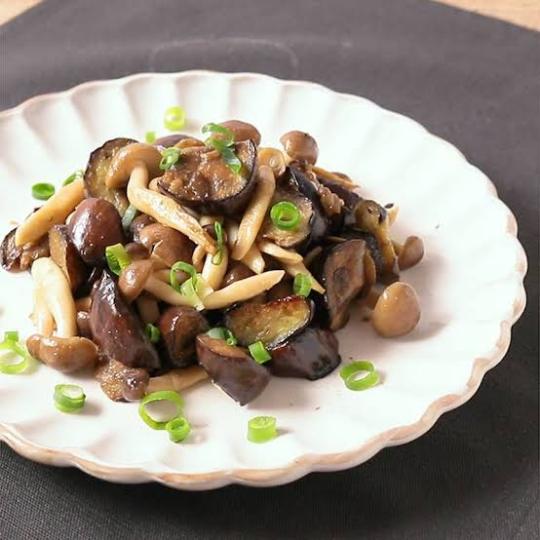
✿ ナスとしめじのゆず胡椒炒め ✍️ 柚子胡椒 小1/2,パプリカ
#cook:副菜#cook:柚子胡椒#cook:なす#cook:しめじ#cook:しめじ×なす#cook:副菜:2025〜#cook:2025〜#cook#cook:酒×醤油×味醂×柚子胡椒#cook:醤油×味醂×柚子胡椒#cook:副菜:なす#cook:副菜:しめじ
0 notes
Text

こふく:通称こふ、こふちゃん、稀にこふたん、こふたろう、こふくさん、別名脅威の黒猫
2022年7月、約2ヶ月半で保護施設から引き取られた。脱肛しており長くないかもと言われていたが、無事改善しすくすく育つ。
Jさんに日々挑みかかる強気な幼少期を送るも実は怖がりで、たまのお客さんはおろかじいちゃんにすら挨拶したことがない内弁慶。
だっこを嫌い、呼べば逃げ、最近は何を考えているか分からない顔で床に落ちており、家主ですら意思疎通は困難。しかし朝家主が目覚めると枕シェアによる寄り添いサービスを行っており、一定の愛情はあるもよう。
米をこよなく愛し、炊きたてご飯や準備中の餅米をむしゃむしゃと食べる。また物理的に我が道を行くため多くの物を壊し、実はかなり家主に散財させている。
Kofuku: known as Kofu, Kofu-chan, rarely Kofutan, Kofutaro,or Kofuku-san, and the alias is the black menace
He was adopted from the animal shelter when he was around 2months and a half. Although it was said he might not live so long because he had the anal prolapse, now he has no problems and has gotten so big.
He had a violent childhood attacking Mr.J every day, but his nature is only a home tiger so he can't greet with not only her guests but grandpa yet.
He hates being hugged, runs away when she calls him, and falls on the floor with the face that doesn't know what he's thinking these days, so it's still impossible for landlady to communicate with him. She can feel his affection only by his staying beside service with sharing her pillow when she wakes up.
He loves rice SO much and eats cooked rice or prepared mochi rice. And he always goes his way physically,then broke a lot of things at home so he let her spend quite an extra money...
5K notes
·
View notes
Text
Compliments in Japanese
How do you give compliments in Japanese? Japanese tends to be a very 曖昧 (あいまい) or vague language, so direct compliments tend to be less common.
お世辞 おせじ compliment
誉め言葉 ほめことば compliment, praise
Here are some compliments that can be used in most situations.

Appearance・見た目
Polite 髪の毛切りましたか?似合いますね。 かみのけきりましたか?にあいますね。 Did you cut your hair? It looks good on you.
Casual 髪の毛切った?似合うよ。 かみのけきった?にあうよ。 Did you cut your hair? It looks good.
Polite そのシャツ/ワンピース/服いいですね。 そのシャツ/ワンピース/ふくいいですね。 That shirt/dress/outfit looks good.
Casual そのシャツ/ワンピース/服いいね。 そのシャツ/ワンピース/ふくいいね。 That shirt/dress/outfit looks good.
Polite いい笑顔ですね。 いいえがおですね。 You have a nice smile.
Casual いい笑顔だね。 いいえがおだね。 You have a nice smile.
Work・仕事
Polite 良くやりましたね! よくやりましたね! Good job! / Well done!
Casual 良くやったね! よくやったね! Good job! / Well done!
Polite お見事です! おみごとです! Great work! / Excellent!
Casual お見事! おみごと! Great work! / Excellent!
Polite 今日のプレゼン/スピーチ/アイディアとても良かったです。 きょうのプレゼン/スピーチ/アイディアとてもよかったです。 Today's presentation/speech/idea was very good.
Casual 今日のプレゼン/スピーチ/アイディアとても良かったよ。 きょうのプレゼン/スピーチ/アイディアとてもよかったよ。 Today's presentation/speech/idea was very good.
Skill・腕前
Polite 料理上手ですね。 りょうりじょうずですね。 You are good at cooking.
Casual 料理上手いね。 りょうりうまいね。 You are a good cook.
Polite 写真を撮るセンスがいいですね。 しゃしんをとるセンスがいいですね。 You have good photography sense.
Casual 写真を撮るセンスがいいね。 しゃしんをとるセンスがいいね。 You have good photography sense.
Polite 英語がペラペラですね。 えいごがペラペラですね。 Your English is very fluent.
Casual 英語がペラペラだね。 えいごがペラペラだね。 Your English is very fluent.
#日本語#japanese#japanese langblr#japanese studyblr#langblr#studyblr#compliments in japanese#japanese language#tokidokitokyo#tdtstudy
315 notes
·
View notes
Note
Hi YuuRei! I just have a question because I do have a hard time finding it due to not being able to read Japanese but I remember on YouTube there was a video somewhere with two TWST VAs (one of them i think was Rook?) doing a cooking show where they cooked Jade's chef event tofu hamburger and Silver's meat stew and have Rook's VA taste test it and I was wondering that if it was real or not? Thank you so much!
Hello hello! ^^ Thank you for this question!
It was real! It was an installment of Crewel's VA Ito Kent's "Good Boy!" series for the Disney Games channel!
There do not seem to be videos of the VAs themselves cooking Jade's chef event tofu hamburger with a taste-testing of Silver's stew available anymore, but the cooking of the hamburger and stew are there!
Tofu hamburger here!
youtube
Meat stew here!
youtube
If you are interested more in "VAs cook and then eat" videos, we have Crewel's Ito and Cater's Kobayashi both preparing and tasting Cater's potato galette dish and Idia's stuffed bell peppers!
Potato Galette here!
Stuffed Bell Peppers here!
If you are more interested in just the how-to cooking of those dishes without VA involvement they are available here (potato galette) and here (stuffed bell peppers).
And those are all the cooking episodes available!
If you are super sure that you saw a video once of Rook's VA tasting the dishes--you are right 👀
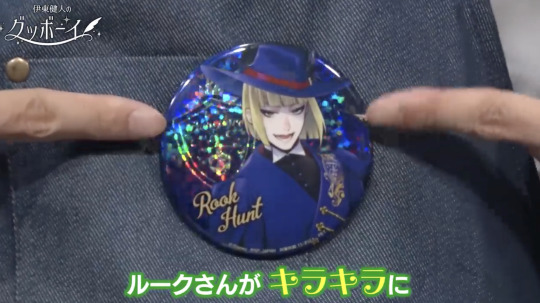
As seen above, two of the videos available are listed as #18 and #19, and yet there are only 12 videos available in the "Ito Kento's 'Good Boy!'" playlist. Rook's VA Itokawa's appearances in episodes #7 (Twst Gourmet: Beef Stew) and #8 (Twst Gourmet: Tofu Hamburger) are no longer viewable!
This is because the official Disney Games YouTube Channel will regularly delete its videos. I am not sure why, but maybe something related to VA appearances? (Most of the VAs come from different agencies, we have no way of knowing the content of one person's contract vs. the content of another's, and I have heard it is all very complicated!)
There used to be a lot more available, such as appearances by Rook's Itokawa, Floyd's Okamoto, Azul's Tamaru, etc. (clips of which can be seen in this compilation video), but videos like Azul's Tamaru hosting an entire episode about keychains, another about Octavinelle rhythmics and a third about Azul's English localization are now gone :<
74 notes
·
View notes
Text
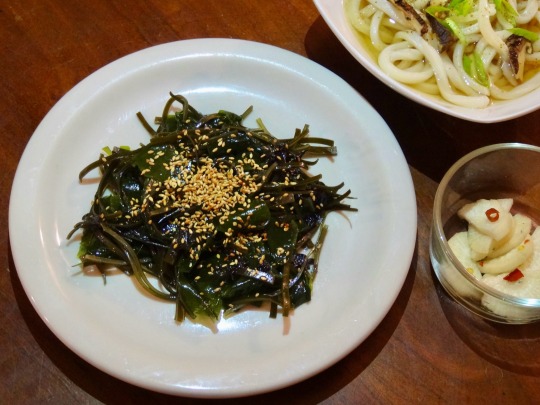
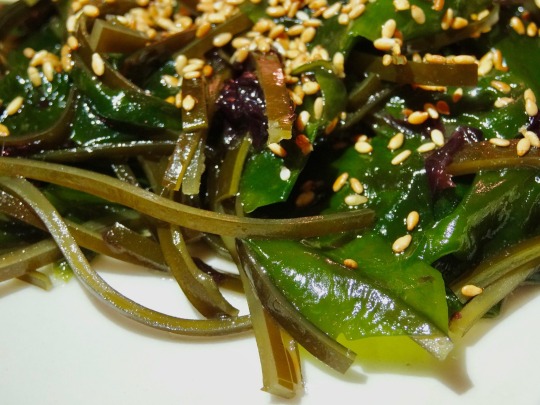
[ID: First photo shows a mixed seaweed salad topped with toasted sesame seeds; in the background are bowls of pickled daikon and kake udon. Second photo is a close-up showing light shining through the seaweed. End ID]
わかめと昆布サラダ / Wakame to konbu sarada (Seaweed and kelp salad)
A wide variety of seaweed-based salads are made by Japanese home cooks. They may contain only a mix of seaweeds and a dressing, but may also feature vegetables including cucumber, carrots, lotus root (レンコン / はす), daikon (だいこん), corn, edamame (枝豆), or onion. Dressings are as varied as cooks, and may be based around sesame oil (ごま油), rice vinegar (米酢), miso paste (みそ / 味噌), ponzu sauce (ポン酢), or mayonnaise (マヨ).
This recipe is a good way to use up reconstituted kombu and wakame that were steeped to make soup stock. It includes instructions for two dressings: one based on rice vinegar and sesame oil, and another with a sesame-mayo base.
"わかめ" or "ワカメ" ("wakame") is likely from "若" ("waka," "young") + "海布" ("me," "seaweed"); it is a particular species of edible seaweed (Undaria pinnatifida) that is farmed in Japan, Korea, and China. It is sometimes called "sea mustard" in English. Without further specification, "wakame" in a culinary context is taken to mean the leaves of the seaweed; these are the same leaves that are eaten in miso soup (みそ汁).
The etymology of "昆布" ("kombu" or "konbu") is unknown. It may be a phonetic Japanese reading of the Middle Chinese "昆布" (Mandarin: "kūnbù") (itself from "綸布" "*krūn pās," "green ribbon" + "cloth"), used to refer to various types of kelp and seaweed. In Japanese, the term refers to any of a few species of edible kelp from the Laminariaceae family.
Dried kombu is steeped to make one type of dashi ("出汁" / "だし"), a stock that is used in various soups and sauces. Once reconstituted, it may be steeped again to make 二番だし ("niban dashi," "second dashi"), sliced and simmered as one ingredient in a 煮物 ("nimono," simmered dish), or roasted and combined with other seaweeds and spices to make 振り掛け ("furikake").
"サラダ" ("sarada") is probably derived from the English "salad."
Note that the "seaweed salad" served at Japanese restaurants in the U.S. is not commonly eaten in Japan. It is shipped out to restaurants and stores pre-packaged, and is made with colored オゴノリ ("ogonori"; "agar" on ingredients lists), きくらげ ("kikurage"; "wood ear mushroom" or "fungus" on ingredients lists), and byproducts of wakame including 茎わかめ ("kukiwakame," wakame stem) and メカブ ("mekabu," wakame sprouts; both listed as "wakame" or "seaweed" on ingredients lists). You may be able to find this salad in the freezer section of your local Asian grocery store. If you want to approximate the texture of this salad at home, try buying some mixture of ogonori, kikurage, kukiwakame, mekabu, モズク ("mokuzu"), and/or ひじき ("hijiki"). Instructions for the dressing are below.
Recipe under the cut!
Patreon | Paypal | Venmo
Ingredients:
For the salad:
2 cups total reconstituted kombu, wakame, hijiki, or other kelp or seaweed
Vegetable additions to seaweed salads are possible and common. Try adding some cucumber, julienned carrots, sliced lotus root, sliked daikon radish, corn, edamame, or sliced onion that's been soaked in plum vinegar for 15 minutes.
If you're including cucumbers, slice them, salt them, allow them to drain in a colander for about 10 minutes, then gently squeeze them of excess liquid, to avoid making your salad watery.
For dressing 1:
1 Tbsp unseasoned rice vinegar (米酢)
1 Tbsp toasted sesame oil (煎りごま油)
1/2 kosher salt
1/2 tsp vegetarian granulated sugar
1/2 tsp Japanese soy sauce (しょうゆ / 醤油) (such as Kikkoman's)
2 tsp toasted sesame seeds (いりごま)
To make U.S. restuarant-style seaweed salad, omit the soy sauce; replace the sugar with high fructose corn syrup; and add a pinch of cayenne pepper, 1/4 tsp of onion powder or yeast extract, and a pinch of MSG.
For dressing 2:
2 Tbsp vegan mayonnaise
1/2 tsp unseasoned rice vinegar (米酢)
1/4 tsp dried ground shiitake mushroom, or vegetarian dashi powder
1/4 tsp vegetarian granulated sugar
Drop of djion mustard
Pinch kosher salt
1 tsp Japanese soy sauce (しょうゆ / 醤油) (such as Kikkoman's)
Drizzle of mirin (みりん)
2 tsp toasted sesame seeds, ground in a mortar and pestle or spice mill
If you eat eggs, you can replace the first five ingredients with 2 Tbsp Kewpie mayo (キューピーマヨ).
For a halal version, replace the mirin with an extra pinch of sugar.
Instructions:
For the salad:
1. Slice kombu into very thin strips. Slice wakame into thin strips, or leave as-is, as desired. Slice other flat dried seaweed into thin strips or bite-sized pieces.
For dressing 1:
1. Whisk all ingredients except sesame seeds together in a small bowl. Toss with seaweed. Top with sesame seeds and serve cold.
For dressing 2:
1. Whisk all ingredients together in a small bowl. Toss with seaweed. Serve cold.
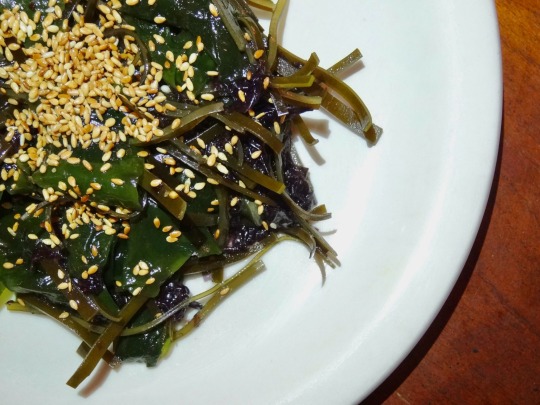
86 notes
·
View notes
Text
食材の多い料理店
The Restaurant of Many Ingredients (Much Meat)
全身白髪だらけだと
As he strokes his red crest,
赤いとさかを撫でながら
Fry Kitchen grumbles that he's covered
フライ・キッチンがぼやく
Head to toe in white hairs
石臼での粉挽きなど
This is the first time in his life
生まれて初めて 昔は
That he's ever ground flour with a stone mortar
そんな身分じゃなかった
This hadn't been his standing in life in the past
.
屍用人に身を落としても
Though he'd stooped to the position of undead servant
家畜の姿に変わっても
Though his form had changed to that of livestock
意外と気分は悪くない
It actually isn't all that bad
今になって気がついたのさ
It was now that he realized
机に積まれた札束など
That stacks of money piled up on a desk
何の意味も無かったんだと
Don't really mean anything
.
肉の焦げた匂いが漂う
The smell of charred meat wafts through the air
次は自分じゃない事を祈る
He prays that he isn't next
.
ずっとうんざりしてたのさ
He'd always been so bored and fed up
23人の兄弟ども
So he finally bid farewell
ようやく別れを告げて
To his 23 siblings
ポーク・チョップは独立した
Pork Chop had set out on his own
嬉しい事のはずなのに
This should have been a happy thing
何故だか少し寂しい
But somehow it was a little lonesome
.
鼻を鳴らして野菜を切る
He cuts vegetables while snuffling and snorting
刃物の扱いは慣れたものさ
He's gotten used to holding a knife
何人も刻んできたから
Since he's chopped up countless people
希代の始末屋だったのに
He'd once been uncommonly stingy
今じゃのろまの従兄弟にさえも
But nowadays he can't even hold a candle
頭があがりゃしないのさ
To those blockhead cousins of his
.
熊の瞳がこっちを見ている
The bear's eyes are looking his way
獲物が自分じゃない事を祈る
He prays that he's not its prey
.
憧れのあの方にならば
Chateau Briand had declared that
食べられても構いませんわ
As long as it was by the one he admired
シャトー・ブリアンは言い切った
He wouldn't mind being eaten
あの日話しかけられなくて
He hadn't been able to speak to them that day
助ける事が出来なかった
And so couldn't save them
後悔は今も残る
His regrets linger even now
.
16人目のコックになる
He'd become the 16th cook
決意して門をたたいたけど
Though he had mustered his will and applied for an apprenticeship
既に屋敷はもぬけの殻
The mansion was already an empty husk
今ではもうあの時とは
And now everything
全てが変わってしまったけど
Is different from the way things were then
変わらないものだってあるの
Yet there are some things that haven't changed
.
けだるげな赤猫をみかける
He spies a listless looking red cat
自分のお腹の肉をなでる
It pats the meat of his belly
.
たどたどしい手つきの料理
I wordlessly gaze upon
行う弟子たちの姿を
The sight of my pupils
俺は無言で眺める
Carrying out their clumsy cooking technique
昔のことなど忘れた
I've forgotten most of my past
それでもこの調理場には
Even so, this kitchen
懐かしい匂いがする
Has a scent that brings back memories
.
誰かと旅をし料理をする
To go traveling with someone, and make food with them,
それがかつて自分が望んだ
Wasn't that the life that I had once
生活だったのだろう��
Wished to have?
店をにぎわす異界の客
These guests from the parallel world bustling through the restaurant,
彼らのために用意された
I reach for the new ingredient
新たな食材を手に取る
That I've prepared for them
.
幸せの花は赤く綺麗で
The flower of happiness is a lovely red
メインディッシュのスパイスに最適
It'll be a perfect spice for the main dish
.
再び弟子たちに目をやる
Again he looks towards his apprentices
選ばなければならない
He'll have to select
メインディッシュの食材を
The main ingredient for the main dish
不足で困る事は無い
He isn't lacking in choice
ここはとても食材の多い
This is Mister Dog's restaurant
ミスター・ドッグの料理店
Of many ingredients
30 notes
·
View notes
Text
Memo for Episode 11 (Ep.35) “The Hunt”
馬閃(バセン)「茘(リー)、という国名(こくめい)は、その一文字(ひともじ)で、建国(けんこく)の物語(ものがたり)を表(あらわ)している。草(くさ)の下(した)に三(みっ)つの刀(かたな)…。草は華(はな)、帝(みかど)の先祖(せんぞ)である王母(おうぼ)を指(さ)し、その下の三つの刀は王母を助(たす)けた三人(さんにん)の武人(ぶじん)を示(しめ)す。三つの刀のうち、下二(ふた)つに比(くら)べて大(おお)きい刀は、北(きた)の大地(だいち)・子北州(しほくしゅう)を指(さ)す。子北洲一帯(いったい)は、高粱(コーリャン)や麦(むぎ)を栽培(さいばい)していて、さらに北に行(い)くと、山岳地帯(さんがくちたい)が広(ひろ)がり…て、聞(き)いてるのか!?」
Basen “Rī, to-iu koku-mei’wa, sono hito-moji’de, kenkoku’no monogatari’o arawashite-iru. Kusa’no shita’ni mittsu’no katana… Kusa’wa hana, mikado’no senzo-de-aru Obo’o sashi, sono shita’no mittsu’no katana’wa Obo’o tasuketa san-nin’no bujin’o shimesu. Mittsu’no katana’no-uchi, shita futatsu’ni kurabete ookii katana’wa, kita’no daichi, Shi-Hoku-shu’o sasu. Shi-hoku-shu-ittai’wa, kōryan’ya mugi’o saibai-shite-ite, sarani kita’ni ikuto, sangaku-chitai’ga hirogari…te, kiiteru-noka?!”
Basen “The character used to write the name of our nation, ‘Li,’ also depicts the story of its founding. Three swords under grass. ‘Grass’ is for ‘flower,’ representing the Mother Royal, ancestor of the emperor. The three ‘swords’ under it represent the three warriors who helped her. Of the three swords, the one larger sword represents the Shihoku-shu, the northern lands. That entire area grows sorghum and wheat. If you go further north, you enter a mountainous region… Hey, are you listening?!”
In this line, Basen explained the Kanji “茘(リー)” in detail. For your better understanding, please see below.

――――――――――――――――――――――――――――――
馬閃「何でこんな娘を父上(ちちうえ)は…」
Basen “Nande konna musume’o chichi-ue’wa…”
Basen “Why does my father care so much about this girl?”
The fact that he said this to her shows how young and immature he is, although she is also at fault for dozing off while listening to his explanation.
――――――――――――――――――――――――――――――
猫猫(はて?)「何(なに)か、変(か)わった趣向(しゅこう)でも?」
Maomao (Hate?) “Nanika, kawatta shuko’demo?”
Maomao (Huh?) “Is this some kind of strange rule?”
趣向(しゅこう/Shuko): There seems to be no word which directly refer to it in English… Idea, plan, or taste is used depending on the context.
趣味・趣向(しゅみ・しゅこう) is sometime used in Japanese. 趣味(Shumi) is “hobby”. For example, let’s say I have a hobby of Karaoke and I have a karaoke party with my friends once a month. And I say 「来月は趣向を変えて、コスプレでアニメソングのカラオケパーティをしよう!」. It means “Next month, let’s do something different and have a cosplay karaoke party singing anime songs!” In this case, 趣味(Shumi) is “hobby: karaoke”, and 趣向(Shuko) is “how we enjoy karaoke: cosplay and sing anime songs”. So I guess I can say 趣向(Shuko) is an idea to enjoy something based on your taste.
The word is also used in the following line later;
猫猫(狩りは、宿(やど)から30分(さんじゅっぷん)馬(うま)に揺(ゆ)られ、徒歩(とほ)で一時間(いちじかん)山(やま)を登(のぼ)った高台(たかだい)で行(おこな)われる。お偉方(えらがた)が捕(つか)まえた獲物(えもの)をその場(ば)で調理(ちょうり)するという趣向(しゅこう)のようだ)
Maomao (Kari’wa, yado’kara sanjuppun uma’ni yurare, toho’de ichi-jikan yama’o nobotta taka-dai’de okonawareru. Oera-gata’ga tsukamaeta emono’o sono-ba’de chori-suru-to-iu shuko’no-yoda.)
Maomao (The hunt takes place at a location half an hour away by horse, and then one hour up the mountain by foot. It seems like the point of the event is to cook the game caught by the nobles on the spot.)
――――――――――――――――――――――――――――――
猫猫「そうですか…」(やっぱり壬氏様はいいとこの出(で)なのか…うん、うん)
Maomao “So-desuka…” (Yappari Jinshi-sama’wa ii-toko’no de nanoka… Un, un.)
Maomao “I see.” (So Master Jinshi is from a good family, after all.)
いいとこ(ii toko): good family, good place = いい所(ところ/tokoro)
The word is also used in the following line later;
李白「こんにちは?あ~!嬢(じょう)ちゃんか!どうしたんだ?こんなとこで」
Rihaku “Kon’nichiwa? Aaa! Jochan-ka! Do-shitanda? Konna toko’de.”
Lihaku “Hello? Hey! Little miss! What are you doing all the way out here?”
――――――――――――――――――――――――――――――
高順「小猫は例(れい)のことを何一(なにひと)つ知(し)らない」
Gaoshun “Shaomao’wa rei’no koto’o nani-hitotsu shira-nai.”
Gaoshun “Xiaomao knows nothing about it.”
例の(れいの/Rei’no): the, that, it
This word is used in situations where the speaker and listener know what it refers to, or when they feel embarrassed to say it directly. It enables you to speak without a third party being able to understand.
The word is also used again in the following line later;
男1「これが例(れい)の…随分(ずいぶん)小型(こがた)だな」
Otoko-Ichi “Korega rei’no… zuibun kogata dana.”
Man-1 “Is this it? It’s quite small.”
――――――――――――――――――――――――――――――
猫猫「はぁ。もともと壬氏様のお食事(しょくじ)です」
Maomao “Haa. Moto-moto Jinshi-sama’no oshokuji desu.”
Maomao “Well, it’s your food, after all.”
はぁ(Haa): casual and broken way of saying “はい: Yes”. It shows that Maomao is questioning why he asks such a question. Otherwise “はぁ” may be considered a rude response.
もともと(Moto-moto): originally
壬氏「本当にいいのか?!」
Jinshi “Honto’ni ii-noka?!”
Jinshi “Are you absolutely sure?”
Maomao has no idea why he’s asking so emotionally, but you all do, maybe. His condition is already not good at this point, and he seems to be unable to control his emotions.
――――――――――――――――――――――――――――――
壬氏「ああ。むしろ食え」
Jinshi “Aa. Mushiro kue.”
Jinshi “Yeah. In fact, I order you to.”
むしろ(Mushiro): rather
むしろ+命令形(めいれいけい/Meirei-kei: instruction form): Or rather, do it.
――――――――――――――――――――――――――――――
猫猫「なぜと言われましても…そういう体質(たいしつ)ですから」
Maomao “Naze-to iware-mashitemo… So-iu taishitsu desu-kara.”
Maomao “All I can say is that’s just how I’m built.”
体質(たいしつ/Tai-shitsu): constitution, physical makeup
――――――――――――――――――――――――――――――
猫猫(お若(わか)いとは大変(たいへん)である)
Maomao (Owakai-towa taihen’de aru.)
Maomao (It’s not easy being young and vigorous.)
If I translate it directly, it will be “It is tough to be young.” But Maomao’s way of saying is suggestive, such as “��若い” instead of “若い” even though it’s not necessary to add “お”(Keigo, honorific) for Basen in her monologue. And also judging from the context, we can understand that “…and vigorous” is hidden in her line.
――――――――――――――――――――――――――――――
猫猫(湯(ゆ)あみまでできるとは…贅沢(ぜいたく)だなぁ…。明日(あした)は狩りか…。つつがなく終(お)わるといいけど)
Maomao (Yuami-made dekiru-towa…zeitaku-danaa… Ashita’wa kari-ka… Tsutsuga-naku owaru-to ii-kedo.)
Maomao (A bath, too? How extravagant. The hunt starts tomorrow. I hope it goes without incident.)
つつがなく(Tsutsuga-naku): formal word which means safely, well, without any incident/trouble.
――――――――――――――――――――――――――――――
男1「ここで、あの方には死んでもらう」
Otoko-Ichi “Koko’de, ano kata’niwa shinde-morau.”
Man-1 “This will be where they die.”
方(かた/Kata): It’s like a Keigo of “人(ひと/Hito): person”, same as “お方(おかた/Okata)”. With “お” or without, it means honorific feeling to the person. And if it means more than two people, 方 becomes “方々(かたがた/Kata-gata)”, so this 方 only refers to the single person: Jinshi. I wonder why they translated it as “they”, which could lead viewers to mistakenly believe that Maomao was also a target. If I were to translate it, I would use “that gentleman.”
死んでもらう(しんでもらう): It's hard to translate this expression into English. ~してもらう means “have someone do” and maybe “Here, (is the place where) that gentleman shall die (for us).” would be my direct translation. In Japanese, such expressions are often used, especially in movies or games, just before someone is going to kill the other person, as a softer way of saying.
This line can be more polite, if you change もらう to いただく: ここで、あの方には死んでいただく.
――――――――――――――――――――――――――――――
猫猫「ちょっとご指名(しめい)があったもので」
Maomao “Chotto goshimei’ga atta-mono’de.”
Maomao “I was asked to join.”
指名する(しめいする/Shimei-suru): ask for a certain person, appoint, designate
――――――――――――――――――――――――――――――
猫猫(李白様も指名を受(う)けたのはいいが、地方出身(ちほうしゅっしん)の身(み)。他(ほか)の気位(きぐらい)の高い護衛たちに、追(お)い出(だ)された口(くち)だろう。最近(さいきん)どんどん出世(しゅっせ)しているようだが、その分風当たりは強(つよ)くなる)
Maomao (Rihaku-sama’mo shimei’o uketa-nowa iiga, chiho-shusshin’no-mi. Hoka’no kigurai’no takai goei-tachi’ni, oidasareta kuchi daro. Saikin don-don shusse-shite-iru-yodaga, sono-bun kaze-atari’wa tsuyoku-naru.)
Maomao (Master Lihaku got invited to join too, but he’s from the countryside. The other prideful guards must have pushed him out. He seems to be climbing the ranks recently, but that does tend to be met with resistance.)
~口(くち)だ(~kuchi da): be one of those who~
気位の高い(きぐらいのたかい/Kigurai’no takai): have lots of pride, prideful
風当たりが強い(かぜあたりがつよい/Kaze-atari’ga tsuyoi): windy, windswept, receive harsh treatment, greatly criticized
――――――――――――――――――――――――――――――
猫猫(避暑地(ひしょち)とはいえ、今日(きょう)は天気(てんき)も良(よ)く暑苦(あつくる)しい。快適(かいてき)に過(す)ごすのも一苦労(ひとくろう)だな…。…こんな暑苦しいのに、ずっと覆面(ふくめん)をつけて…料理(りょうり)にも手(て)を付(つ)けないつもりか?どんなに怪(��や)しい覆面姿(ふくめんすがた)でも、上座(かみざ)に座(すわ)っていれば、この中で一番(いちばん)の上客(じょうきゃく)ということなのだろう)
上座(かみざ/Kami-za): the top seat of honor, upper seat ⇔ 下座(しもざ/Shimo-za): the bottom seat, lower seat
I don’t know how it is in China, but in Japan, there are usually 上座 and 下座 in each room, and the guests are guided to 上座. Normally, 上座 is located at the farthest from the door/entrance, and 下座 is at the closest. It depends on each room, and even if it’s not the farthest from the entrance, the seat near the 床の間(とこのま/tokonoma) alcove or one with a good view may be the 上座.
――――――――――――――――――――――――――――――
猫猫(あれが楼蘭妃(ロウランひ)の父(ちち)、子昌様。子北洲の長(おさ)で、この狩りの主催者(しゅさいしゃ)だ。…ん?何か言われたのか?…いや、あのやたら外面(そとづら)のいい宦官が、あんなあからさまな態度(たいど)を取(と)るだろうか…。もしかすると、この暑さのせいで…)
Maomao (Are’ga Roran-hi’no chichi, Shisho-sama. Shi-Hoku-shu’no osa’de, kono kari’no shusai-sha-da. …N? Nanika iwareta-noka? …Iya, ano yatara soto-zura’no ii kangan’ga, anna akarasama-na taido’o toru-daroka… Moshika-suruto, kono atsusa’no sei’de…)
Maomao (That’s Master Shishou, Concubine Loulan’s father. He is the leader of the Shihoku-shu region and the organizer of this hunt. Hmm? Did he say something to him? Would that infinitely well-mannered eunuch show such an obvious attitude? Wait, could it be, because of the heat…)
外面のいい(そとづらのいい/Soto-zura’no ii): looks nice outside (but…)
It’s usually used in a negative sense, like “彼は誰にでも外面はいいが、家族には横柄だ(かれは、だれにでもそとづらはいいが、かぞくにはおうへいだ : He looks so nice with everybody outside, but he’s arrogant towards his family.”
あからさまな(Akara-sama-na): obvious, bald, bare, blatant
It’s also usually used in a negative sense, like “彼女はあからさまに私に意地悪だ(かのじょは、あからさまにわたしにいじわるだ/Kanojo’wa akara-sama-ni watashi’ni iji-waru da : She’s obviously mean to me.”
――――――――――――――――――――――――――――――
壬氏「自分でやる!お前のも貸(か)せ。俺の方(ほう)が力(ちから)があるだろう」
Jinshi “Jibun’de yaru! Omae’nomo kase. Ore’no-hoga chikara’ga aru-daro.”
Jinshi “I’ll do it myself. Give me yours, too. I’m stronger than you.”
猫猫「はあ」
Maomao “Haa.”
Maomao “Yes.”
Here is はあ instead of はい again, which shows Maomao is wondering why his mood seems worse. I think they just translated it as “yes”, because replacing by “yeah” or something would sound too rude.
猫猫(良かった…さっきより体調(たいちょう)は良さそうだ。機嫌(きげん)は悪(わる)そうだけど)
Maomao (Yokatta… Sakki-yori taicho’wa yosa-soda. Kigen’wa waru-soda-kedo.)
Maomao (Good, he looks healthier than earlier. His mood seems worse, though.)
It’s interesting that Maomao has no idea about his behavior, in spite that he’s just embarrassed.
――――――――――――――――――――――――――――――
猫猫「粗末(そまつ)な物(もの)で申(もう)し訳(わけ)ありませんが、食(しょく)していただけますか」
Maomao “Somatsu-na mono’de moshi-wake ari-masen-ga, shoku-shite-itadake-masu-ka.”
Maomao “I know it isn’t much, but would you like to eat any of this?”
粗末な物(そまつなもの/Somatsu-na mono): something shabby/poor/simple
That is a standard phrase to humble, which is used when giving a present in Japan, but in this case Maomao is saying that because butterbur is just a vegetable and it’s not something gorgeous.
~していただけますか(~shite-itadake-masuka): Would you mind if~? Could you~, please? Would it be possible to~?
Although they translated it into “would you like~,” I feel something is off a bit. I think “I’m afraid it’s just something simple, but could you please eat this, please?” is better, because she is not asking him if he’ll eat it, and actually, she’s asking him to eat it.
――――――――――――――――――――――――――――――
I’m sure you all thought “Don’t end here!” The incident where he jumped into the waterfall wasn’t in the original web novel, so when I read this in the light novel first, I was so surprised and thought “What? What’s going on?!” I’m really looking forward to the next episode, but I’m also a little worried, because some online and YouTube posts have overemphasized the sexiness of the scene. (Sorry, it might be the opposite of what you expect!) Anyway, let’s enjoy the next episode together!
#apothecary english#apothecary romaji#the apothecary diaries#apothecary diaries#learning japanese#japanese#薬屋のひとりごと#薬屋のひとりごと 英語#薬屋 英語 学習#japan#KNH#season 2
8 notes
·
View notes
Text
Lotus root hamburger steak (prose, cooking)

Dish

cutting
The lotus root is a sacred plant. It is edible in Japan. It is a bit hard when cooked as is, so at home, I make hamburger steaks. Mix finely chopped 200g lotus root with salt and thyme, also chop 1/2 an onion and add it. Knead it with flour, and shape it into a hamburger steak. Allocate plenty of water, The moisture content should be about the same as that of okonomiyaki. if you knead it too hard it will become hard. Fry in a frying pan with olive oil. It has a chewy texture and is delicious. It is a vegetarian dish that does not use any meat.
2024.11.26
蓮根のハンバーグ (prose, cooking)
聖なる植物蓮根。日本では食用にする。そのまま調理すると少々硬いので、我が家ではハンバーグにする。細切れにした200gの蓮根に、塩、タイムを混ぜ、玉ねぎ1/2もみじん切りにして加える。小麦粉と練り合わせて成形する。水を多めに配分し、「お好み焼き」くらいの水分量に。あまりつよく捏ねると硬くなる。フライパンにオリーブオイルを敷いて焼く。もちもちした食感で美味しい。肉を一切使わない、ヴェジタリアン向きの料理。
7 notes
·
View notes
Text
Translating the Human Side introductions for Witch's Heart, because I've always wanted to know what they said. If someone else has translated these without DeepL, please let me know.
[ translated with DeepL. ] [ localized by me. ] [ DeepLで翻訳 ] [ ローカライズ ]
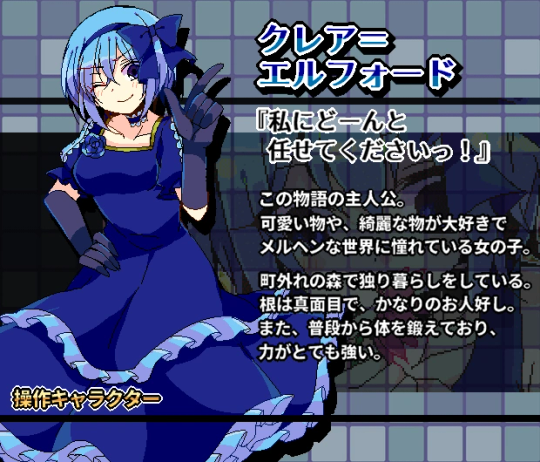
Claire Elford
"I'll take care of it!"
The main character of this story.
She loves pretty and beautiful things,
and longs to live in a fairy tale world.
She lives alone in the forest on the outskirts of town.
She is earnest at heart and quite good-natured.
She also works out on a regular basis and is extremely strong.
and I'll include the Japanese text as well, because there's no reason not to. The golden text [ 操作キャラクター ] is just [ character ].
クレア
エルフォード
『私にどーんと
任せてくださいっ!』
この物語の主人公。
可愛い物や、綺麗な物が大好きで
メルヘンな世界に憧れている女の子。
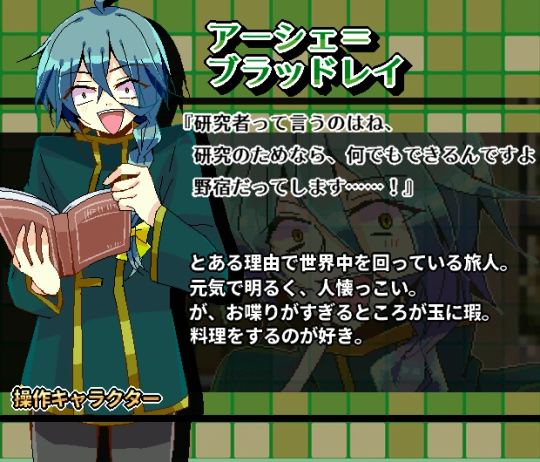
町外れの森で独り暮らしをしている。
根は真面目で、かなりのお人好し。
■また、普段から体を鍛えており、
力がとても強い。
Ashe Bradley
"You know what they say about researchers.
I can do anything for the sake of research.
I can even camp in the wild…………….!"
A man who travels around the world for one reason or another.
He is energetic, cheerful, and friendly.
However, he is a bit too talkative.
He likes to cook.
アーシェ
ブラッドレイ
『研究者って言うのはね、
研究のためなら、何でもできるんですよ
野宿だってします……………!』
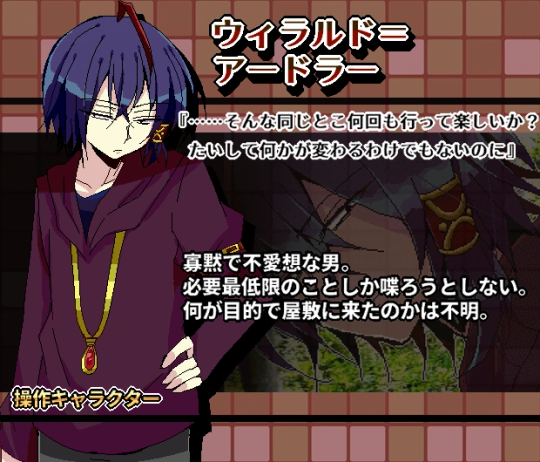
とある理由で世界中を回っている旅人。
元気で明るく、人懐っこい。
が、お喋りがすぎるところが玉に瑕。
料理をするのが好き。
Wilardo Adler
"How much fun is it to go to the same place over and over again?
It doesn't change."
A taciturn, unsociable man.
He only speaks the bare minimum.
It is unclear why he came to the mansion.
ウィラルド
アードラー
そんな同じとこ何回も行って楽しいか?
たいして何かが変わるわけでもないのに』
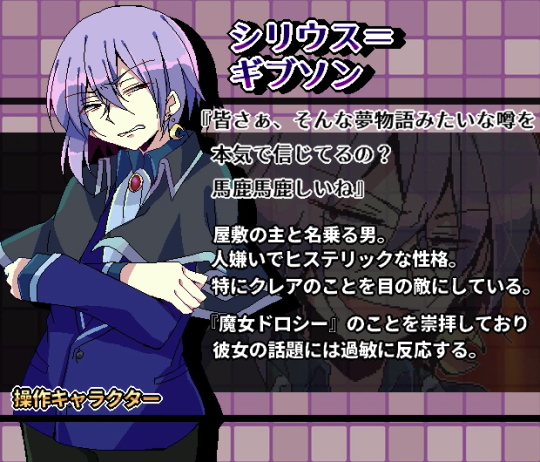
寡黙で不愛想な男。
必要最低限のことしか喋ろうとしない。
何が目的で屋敷に来たのかは不明。
Sirius Gibson
"Do you people really believe those fantastical rumors?
They're absolutely ridiculous."
A man who claims to be the owner of the mansion.
He is misanthropic and hysterical.
He is especially hostile to Claire.
He reveres "The Witch Dorothy",
and is sensitive to any mention of her.
シリウス
ギブソン
『皆さぁ、そんな夢物語みたいな噂を
本気で信じてるの?
馬鹿馬鹿しいね』
屋敷の主と名乗る男。
人嫌いでヒステリックな性格。
特にクレアのことを目の敵にしている。
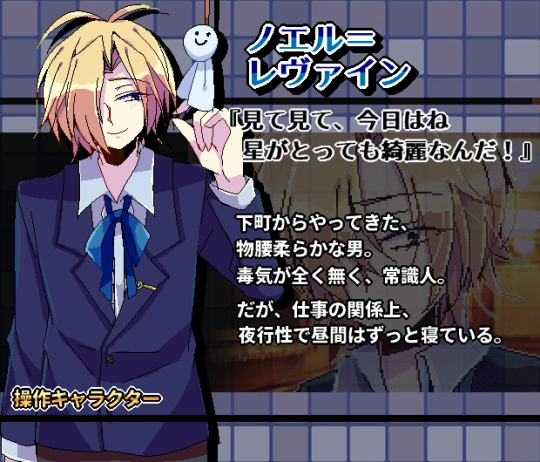
『魔女ドロシー』のことを崇拝しており
彼女の話題には過敏に反応する。
Noel Levine
"Look, look.
The stars are so beautiful tonight!"
A soft-spoken man from downtown.
He is a sensible man with no venom in his voice.
However, due to his work, he is nocturnal and sleeps all day long.
ノエル
レヴァイン
「見て見て、今日はね
星がとっても綺麗なんだ!』
[ Obsessed with Noel being from downtown... And Sirius' hysteria ]
下町からやってきた、
物腰柔らかな男。
毒気が全く無く、常識人。
だが、仕事の関係上、
夜行性で昼間はずっと寝ている。
#witchs heart#witch's heart#claire elford#ashe bradley#wilardo adler#sirius gibson#noel levine#illym translation
34 notes
·
View notes
Text
chapter 15: Inside Pumpkin Witch
よく来たな。 最近、オマエ来るのが楽しみ。
冗談じゃないよ。ほんとだよ。
Thanks for coming. I’m always looking forwar��� to it.
No joke, it’s for real!
[MEILING:] Thanks for coming. I look forward to your visits lately.
I'm not joking. I'm serious.
-------
メイリン、用事が無いと 街に出ないから知らないけど、
最近、街が騒がしいな。 来るお客の顔も暗い人多い。
I rarely go to town, so I don’t know, but recently
town is crazy. Many cust- omers come with dark face.
[MEILING:] I don't go out in the city unless I have a reason, so I don't know why...
...but there's been a lot of trouble lately. A lot of my customers come in looking depressed.
-------
だけどオマエは、 いつも瞳がキレイ。
オマエを見ていると元気出る。
But always your eyes look beautiful.
I feel good looking at you.
[MEILING:] But your eyes are always beautiful.
Looking at you cheers me up.
------
きっと心に力があるからね。 メイリンそう思う。
昨日、マーマに電話した。 いろいろ話したよ。
You must have power in your heart, I think so.
Yesterday I call Mama. We talk about many things.
[MEILING:] You must have power in your heart. That's what Meiling thinks.
I called Mama yesterday. We talked about many things.
------
この街のことや。店のことや。 何でも話す。
オマエのことも話した。 マジメで頭良い人が居るって。
This town, this shop, talk about everything.
I talk about you. Say there is serious, smart guy here.
[MEILING:] The city, my shop. We talked about everything.
We talked about you. I said there's a smart, honest guy here.
-----
勝手に話して悪かった。 でも許してくれるな。
メイリン、もうすぐ帰るかも しれないから、時間が無いね。
Sorry for talking without permission. You forgive me.
Maybe I go back to China soon, so no time.
[MEILING:] Sorry for talking without you knowing. Forgive me, okay?
Meiling doesn't have much time. I might go back to China soon.
------
中国で少し用事がある。 でもまた来るから心配不要。
さあ、今日もいきなり始める。 頭脳心理娯楽!
I have errand in China. But I come again, no worries.
Today we start again, psychological test game!
[MEILING:] I have some business in China. But no need to worry. I'll come back again.
Okay, here comes today's sudden psychological test game!
------
メイリンの考えていること、 わかるか、わからないか。
始める、いいな!
You understand or no understand my thinking.
We start, OK?
[MEILING:] Do you understand what I'm thinking, or no?
Let's start!
=======
帰るの嬉しい
マーマの料理食べる
店はしばらくお休み
だけど仕方ない
Going home’s great
Eat mother’s food
Shop’s closed
Can’t be helped
Happy to go home
Eat Mama's cooking
Close the shop for a while
But that can't be helped
--------
パーパの手伝い
保安局の仕事
優秀な人を探す
包子たくさん食べる
Helping father
Job at the NSA
Search for an adept
Eat lots of dumplings
Helping Baba
Job at the Security Bureau
Finding talented people
Eating lots of steamed buns
-------
この人 気に入るか?
読心術持つ者
両親気に入るかも
一緒に来るか?
Interested in him?
A mind reader
Parents might like it
Will you come too?
Interested in him?
A mind reader
Parents might like him
Would [he] come too?
=======
さあ、メイリンは中国帰ったら 何すると思うか?
What will I do when go back to China?
[MEILING:] Okay! What is Meiling gonna do when I go back to China?
-------
>パーパと仕事 | Working with Papa
>マーマと買い物 | Shopping with Mama
>友達と旅行 | Go on trip with friends
======
{OPTION 2: Shopping with Mama
それもいいな~。
マーマと久しぶりに西安の街歩く。 それ楽しみ!
That sounds good...
Walk around Xian town with Mama, I look forward to it!
[MEILING:] That's good too...
Walking around Xi'an City with Mama again. I'm looking forward to it!
-------
でもその理由だけで、 メイリン、店を休まないね。
もしそうしたら、マーマは 半分喜ぶけど、半分怒る。
But I don’t take vacation for just that reaso�� only.
If I do, Mama is half happy but half angry too.
[MEILING:] But I'm not closing up shop just for that.
If I did, Mama would be half happy, but half angry too.
------
仕事は大切ね。それを無視する、 よくないこと、わかるな。
だから間違い。残念だったな。
Job is important. It’s no good to ignore job, OK?
So mistake answer. How unfortunate!
[MEILING:] Work is important. You can't ignore that, okay?
So, wrong answer. Too bad.
--------
でもまたガンバル、それでいい。
メイリン、期待してる。
But you try again, OK?
I count on you.
[MEILING:] But you can try again.
I have high hopes for you.
2}
=======
{OPTION 3: Go on trip with friends
あっ、それいいな。
中国を全部まわること、 それ、メイリンの夢の一つ。
Ah, that sounds nice.
My dream is go all around every part of China.
[MEILING:] Ah, that sounds nice.
One of my dreams is to travel all of China.
-------
我の生まれた国なのに、 まだ全然見ていない。
勉強と仕事が忙しいから、 仕方ないね……。
It’s my mother country, but I barely see anything yet.
So busy with study & work, so it can’t be helped.
[MEILING:] It's the country where I was born, but I haven't seen anything.
I've been so busy with work and school...
[NOTE: 我 in the first line can be the Japanese first-person ware, but I think in this case it's supposed to be the Mandarin wo.]
-------
だから今まで行ったところは 北京だけ。あと日本ね。
でもいつか行く。それ絶対。
So far I only see Beijing. And Japan.
But some day I go for sure!
[MEILING:] So far I've only been to Beijing. And Japan.
But I'm going someday for sure!
-------
中国広いから、全部まわるの かなり大変よ~。
でも友達と行くしない。
China is big, so very hard to see everything.
But I must go with friend.
[MEILING:] China is huge, so it's very hard to travel all of it.
But I have to go with a firend.
------
その時は、メイリン、 たぶん好きな人と一緒……。
火車(列車)で、ゆっくりまわる。 いろんな場所で泊まりながら。
Maybe I go with man I love...
Take slow train, stay over- night many places.
[MEILING:] Maybe with the one I love...
I'll travel by slow huoche (train), stopping overnight in all kinds of places.
-------
だからその時の楽しみ。
あ~あ、間違ったな。 メイリンの心を深く読みすぎ。
I look forward to it.
Ah, you make mistake. You read my mind too deep.
[MEILING:] So I'm looking forward to that time.
Aah, wrong! You read too deep in my mind.
------
でも間違ったけど、 楽しかったから、いいと思う。
またガンバレ! 加油よ!
You make mistake, but it was fun so it’s OK.
You try again! Try hard!
[MEILING:] So you were wrong, but it was fun, so that's okay.
Try again! Jiayou!
3}
=========
{OPTION 1: Working with Papa
あいや~、よくわかったな。
オマエ、やっぱり読心術あるな。
Aiyah, so clever!
You can read minds, huh?
[MEILING:] Aiyah, you got it.
You really are a mind reader.
-------
それともメイリンの心だけが、 わかるか?
どっちにしてもビックリした。
Or maybe only my mind, you understand?
Anyway I’m surprised!
[MEILING:] Or maybe you can only understand my mind?
Either way, I'm surprised.
------
オマエの言う通り。 パーパの仕事手伝いに行く。
大事な仕事だから仕方ないな。
Just like you say. I work with Papa.
It’s important job, so it can’t be helped.
[MEILING:] You're right. I'm going to help Baba at his job.
It's an important job, so I have no choice.
------
でも、少しイヤなところある。
これ絶対言うな、いいか。
But there is bad thing.
You don’t tell no one, OK?
[MEILING:] But there is one little downside.
Don't tell anyone about this, okay?
-------
メイリン、偉い人ばかりの所で、 働かなくてはダメ。
パーパは偉いけど、メイリンは 少しも偉くないね。
I have to work at place with many important people.
Papa is very important, but I’m not so much.
[MEILING:] I have to work somewhere with many important people.
Baba is very important, but I'm not so much.
------
だから絶対ワタシ気を使う……。 はぁ~、大変よ。
日本も大変だけど、中国も大変ね。 国が広いし、民族も多い。
So I must be very polite... Ah, it’s so hard...
America is hard, but China too. Many people & places.
[MEILING:] So I'll have to be very careful... *sigh* It's so hard.
It's hard in Japan too, but then China is hard. The country is huge, so there are lots of different ethnic groups.
-------
だから人民のため働く。 これパーパの言葉。建国の精神ね。
わかるか? メイリン大変なんだよ。
So I work for the people. Papa say so, build country!
You understand? I have many troubles!
[MEILING:] So I work for the people. That's what Baba says. That's the spirit of founding a nation.
You understand? Meiling has it hard.
-------
でも、よくメイリンの心 オマエ、わかったな。
メイリン、考えること早い。
But you really understand my heart, yeah?
I think very fast.
[MEILING:] But you really understand my heart.
I think very fast.
-------
だから誰も普通に読心できない。 それスゴイこと。
やっぱり、オマエ、中国に来る。 そのほうが活躍できる。
So nobody can read my mind. But you did, so amazing!
You come to China. You make lots of money there.
[MEILING:] So usually, no one can read my mind. It's amazing that you can.
You really should come to China. You'd be very successful there.
-------
10億の人民とワタシのために、 来てくれれば感謝する。
パーパとマーマも、きっと喜ぶ。
You come to China, me and 1 billion people thank you!
Papa & Mama will be happy, too!
[MEILING:] I'd be grateful if you come, for one billion people and me.
Baba and Mama will be happy, too!
-------
オマエ、真剣に考えて欲しい。 大事な話よ、いいな?
ワタシと一緒に、中国を救え。
You think seriously. This is very important, OK?
You save China with me.
[MEILING:] I want you think about it seriously. This is very important, okay?
Come save China with me.
-------
中国人民とワタシが待っている。
キャア! 恥ずかしい! まるでプロポーズね、これ。
ワタシ、恥ずかしいから逃げる。 オマエ考えておく、なっ!
Me & China are waiting.
Uwa, how embarassing! Like I proposing to you!
I’m embarassed so I run away, you consider, OK?
[MEILING:] The citizens of China and I will be waiting.
Kyaa! So embarrassing! It's like I'm proposing!
I'm gonna run away because I'm embarrassed. But you think about it, okay?
3 notes
·
View notes
Photo

✿ 美腸きのこペースト ✍️ アーモンドきなこ黒ゴマパウダー,チーズ1P
#cook:2025〜#cook:ライ麦パン#cook:ペースト#cook:きのこペースト#cook:きのこ#cook:しめじ×まいたけ#cook:塩麹#cook#2025〜#cook:主菜#cook:vegan#cook:vegan:主菜
0 notes
Text

ヤツは家主にとってもキョウイのクロネコなのよ
ヤツの家主へのアクギョウを
あらためて皆さんにおしえるのよ
He is the menace also for my landlady...so I'm going to tell you about his wrongdoing again.
れいぞこの こおりすとっかーをあけて できたこおりを ぜんぶとかした
↑ゆか水びたし
家主がこおりを作らなくなったら こおりすとっかーに入っていた
↑フタつきカゴをかうことになった
たおるカゴに入り くろい毛だらけにした(シャシンさんしょう)
タナにのぼってフキンカゴをおとす
↑ぜんぶせんたくすることになった
↑フタつきカゴをかうことになった
ゴハンじゃぁ たいまーじかんまえにフタをあけて ゴハンをダイナシにした
ゴハンじゃぁ かってにあけてくう
↑ヨコぼたんのじゃぁをかうことになった
おべんとバコのゴハンをくう
おもちつきのおコメをかってにくう
パスタのふくろを あけてかじる
らぁめんのふくろを あけてかじる
ぷりんくってる家主をおそう
He opened the ice stocker of her refrigerator and let all ice cubes melted
↑it inundated the floor
He entered that stock space after she quit to make ices
He entered her towel box(example photo) and put black furs all the towels
↑ she needed to buy a new box with a lid
He threw away her kitchen cloth box when he climbed and entered the shelf
↑she needed to wash them again
↑ she needed to buy a new box with a lid
He opened the rice cooker before it started to cook so she couldn't have rice at the morning
He opened the rice cooker and ate rice
She needed to buy a new cooker with the side button
He ate rice in her lunch box
He ate mochi rice before she cook
He opened the package of pasta and ate them
He opened the package of lamen and ate them
He raids her every time while she's eating her favorite pudding
6K notes
·
View notes
Text
東京都
Japanese Prefectures: Kantō - Tokyo
都道府県 (とどうふけん) - Prefectures of Japan
Learning the kanji and a little bit about each of Japan’s 47 prefectures!
Kanji・漢字
東 ひがし、トウ east
京 キョウ、ケイ capital; 10**16 (ten quadrillion)
都 みやこ、ト、ツ metropolis, capital
関東 かんとう Kanto, region consisting of Tokyo and surrounding prefectures
The capital of Japan, Tokyo has 23 special wards (東京都区部), 26 cities, 1 district (西多摩郡), and 4 subprefectures (支庁)

Tokyo is the largest urban and industrial agglomeration of Japan. Since ancient times the unassuming fishing village of Edo existed for centuries before the Tokugawa shogunate (1603-1867) made it into the capital city, while the imperial family remained in Kyoto. The Tokugawa shogunate ended with the Meiji Restoration of 1868, and Edo became the official capital of Japan, renamed to Tokyo, meaning "eastern capital." It was already the largest city in Japan and the population exceeded one million. Now it is one of the world's most populous cities and the largest industrial, commercial, and financial center in Japan. The Imperial Palace, the home of the emperor of Japan, lies at the heart of the city, encircled by stone-walled moats and broad gardens. Tokyo is the chief transportation hub for Japan and an important international traffic center, and also Japan's major cultural center.
Recommended Tourist Spot・おすすめ観光スポット Shinjuku Gyoen National Garden - 新宿御苑

Shinjuku Gyoen National Garden
When it comes to Tokyo there is an endless list of things to do and see. So picking one to highlight was difficult, but I went with a favorite of mine. Located a short walk from Shinjuku Station, spacious lawns, meandering walking paths and tranquil scenery of Shinjuku Gyoen provide a relaxing escape from the busy urban center around it. In the spring, Shinjuku Gyoen becomes one of the best places in the city to see cherry blossoms, and in the fall the autumn colors are stunning. With an admission fee of only ¥500, it is a wonderful way to get lost in the beauty of an oasis in the middle of the metropolis.
Shinjuku Gyoen, meaning Shinjuku Imperial Garden, originated during the Edo Period (1603-1868) as a feudal lord's Tokyo residence. Later, it was converted into a botanical garden before being transferred to the Imperial Family in 1903 who used it for recreation and for the entertainment of guests. The park was almost completely destroyed during World War II, but was eventually rebuilt and reopened in 1949 as a public park.
There are three main gardens - the Japanese garden, the French garden, and the English garden - as well as a greenhouse full of tropical flowers. There are restaurants and cafes, a tea room, and a rest house with souvenirs. The garden is so large that I have never been able to view it all in one visit.
Regional Cuisine - 郷土料理 Monjayaki - もんじゃ焼き

Monjayaki (source)
A type of pan-fried batter or savoury pancake, monjayaki is Tokyo’s version of okonomiyaki, the iconic dish of Hiroshima and Osaka. Monjayaki looks less like a potato pancake than okonomiyaki and retains a slightly runny appearance similar to melted cheese, even when cooked, but the cooking method remains the same.
The origins of monjayaki or monja can be traced back to a crêpe-like confection known as mojiyaki in the late Edo period. It was called mojiyaki (moji means character, as in hiragana) because people used it to write characters on the hot griddle surface. Monja experienced a popularity boom in the 1980s that led to the birth of Monja Street on Nishinakadori in Tsukishima where today 75 monja restaurants line the street.
To cook monja, first, stir-fry the ingredients, consisting of meats, veggies, cheese, and mochi or crispy noodles – on the griddle. Once they’re almost cooked, form a doughnut shape with a hole in the middle and pour the batter into it. Wait until the batter starts to boil, then mix it all up and press it down with the spatula to better cook it. Then scoop it into a bowl or onto a plate and enjoy.
Tokyo Dialect・Toukyou no hougen・東京の方言
Generally, the Tokyo dialect is taken to be Standard Japanese, although slang can vary between regions and social classes. Traditional dialects in central Tokyo are generally classified in two groups: Yamanote dialect (山の手言葉, Yamanote kotoba) and Shitamachi dialect (下町言葉, Shitamachi kotoba). The Yamanote dialect is characteristic of the old upper class from the Yamanote area. Since the Meiji period, Standard Japanese has been based on the Yamanote dialect. The Shitamachi dialect is a working-class dialect, and it preserves features of Edo Chōnin (Edokko) speech, also called Edo dialect (江戸言葉, 江戸弁, Edo kotoba, Edo-ben). Tokyo-style rakugo is typically played in the Shitamachi dialect.
Tokyo dialect dates back to Tokugawa Ieyasu's establishment of Edo as the main capital. Large groups of people, speaking a range of dialects migrated across the country from the former capital of Kyoto. The Kyoto dialect was the prestige language of the time and strongly influenced the Edo dialect in the early Edo period. The Edo dialect grew as Edo became the largest city in Japan and became the new prestige language in the late Edo period. Because of its unique history, especially in relation to the Kyoto dialect, Tokyo is what is known as a language island in the Kantō region. For example, traditional Kantō dialects have been characterized by the use of volitional and presumptive suffix -be, which is rarely used in Tokyo.
あたぼー (atabou)
Standard Japanese: 当たり前 (atari mae) English: obviously
あんまり (anmari)
Standard Japanese: あまり (amari) English: not very much
しょっぱい (shoppai)
Standard Japanese: 塩辛い (shiokarai) English: salty
でかい (dekai)
Standard Japanese: 大きい (ookii) English: big
About Tokyo dialect (Japanese page)
#japanese prefectures#日本語#japanese#japanese language#japanese langblr#langblr#studyblr#都道府県#東京都#tokyo
30 notes
·
View notes
Text
2025.05.12・We'll be back!
(lit. "Because we'll be back, please treat us well." More on the near untranslatable phrase yoroshiku onegai on the pinned post.)
心地良い (kokochiyoi) pleasant, comfortable
余韻 (youin) lingering memory (from very recent event), aftertaste, afterglow
包まれる (tsutsumareru) to be wrapped up in [something]
目覚め (mezame) awakening, waking up
札幌 (sapporo) Sapporo
是非 (zehi) defnitely, certainly, by all means
待っている (matteiru) waiting, to be waiting
感じてほしい (kanjite hoshii) [I] want [you] to have the feeling
画像 (gazou) image(s), picture(s)
画像をアップ (gazou wo appu) upload picture(s)
北海道 (hokkaidou) Hokkaido
しか〜ない (shika .... nai) only (nuance of disappointment), nothing but...
調べ (shirabe) investigating, researching (non-academic, non-laboratory)
〜たら (-tara) if [done,]..., when [you do,]...
埼玉 (saitama) Saitama
茨城 (ibaraki) Ibaraki
店舗 (tempo) brick-and-mortar store
らしいい (rashii) "it seems [to be]", characteristic of [something]
かしこい (kashikoi) wise, clever, smart
かしこくになる (kashikoku ni naru) to become more clever, to become smarter
〜なら (-nara) if [you] were to...
豪快 (goukai) hefty, hearty, magnificent, tremendous
イカ (ika) squid
美味しかった (oishikatta) [it] was delicious
ウマイ (umai) [cooked] to perfection, done skillfully
藤岡市 (fujioka-shi) the City of Fujioka
開催 (kaisai) holding (an exhibition, etc.), hosting (an event, etc.)
終了 (shuuryou) ending, termination, completion
足を運ぶ (ashi wo hakobu) to visit on foot (honorific language)
感謝 (kansha) gratitude
心から (kokoro kara) from [the bottom of] one's heart
地元 (jimoto) local, regional
何か (nanka) something
一緒に (issho ni) together
嬉しい (uresshi) happy
2 notes
·
View notes
Text
2024/12/2〜

12月2日 すっかり真っ暗の中帰っている。 やっぱりここからが、お仕事復帰の本番。お休み前はまだ外が明るかった。
一期下の方から頂いたアドベントカレンダーのハーブティーを開けてみると、クリスマスツリーの形に開く箱でとても可愛かった! 今日はもう2日目だけれど、1日目のお茶を飲んだ。濃い紫色だった。

先週末もらった水戸芸術館のタワーのペーパークラフトを出勤前とお昼休みに作り始めた。 ハサミを使うのは苦手だけれど、思ったより黙々と作業できて楽しい。坂口恭平さんの“cook”にも手首から先の運動は心に良いと書いてあった気がする。
上司にお付き合いいただいて、一緒に現場に行ってもらったけれど、8割は業者の方とおじさん同士の立ち話で、もう何度同じ話を違う角度から話すんだ?と遠くの茂みや、不意にやってきた女子高生の行列を見ていた。 この週末にした趣味の射撃の話や、射撃で撃った鴨や亥豚を解体した話をしていた。相槌すら打つ気力もなく、なんだか私の方もこの人と一緒にお仕事をするのが嫌かもしれない、と思った。もしかしてこうゆう時間の積み重ね故に長い労働時間を生み出しているのか?と気が付いてしまった気持ち。
ちゃんと生活のことをセーブして、夜の時間を過ごせますように。

12月3日 今年の年末はインターネットに言葉や写真を置くことはやめよう。 とてもつらいから、今年はやめよう。 と、思っていたのに、昨日の帰り道にインターネットに置く言葉をずっと考えている頭があった。久しぶりに、国道に車のライトが並ぶ車窓の風景を眺めていたら、まだ何かを考える事ができる頭のエネルギーを使いたくなり、とりあえず文字起こしをしていた。 そして、やっぱり少し楽しかった。

年賀状もつらいからやめよう、と思っていた。 でも2024年の悲しみを、2025年の年賀状にしようと思った。ずっと悲しかったから、どの写真を使っても悲しみの年賀状になってしまうんだけど。
昨日まだフォローしていなかったとあるアカウントをフォローしたところ、とても嬉しいメッセージをいただいた。インターネットと写真を、ぎりぎりでも続けてきてよかった、とこうゆう時に思わせてもらえる。
社会の方々ときのこの山とたけのこの里で関わっていこうキャンペーンを続けてしまっていて、今日も、何でこんなことしてしまったんだ?と帰り道に死にたくなってしまった。 わざわざ「お菓子ありがとうございました」と話しかけてくれた方もいて、普通に「ペーパークラフトのお礼です!」と返答をすればよかったのに、よくわからないモードでよくわからない返答をして、相手に困り笑いをさせてしまった気がする。 普通に会話ができない。
やっと明るくなった寒い朝の時間に毎日すれ違う方と、今日は暗い帰り道にもすれ違った。
アドベントカレンダーのハーブティー、今日は黄緑色の草の匂いがするお茶でした。

4 notes
·
View notes
Text
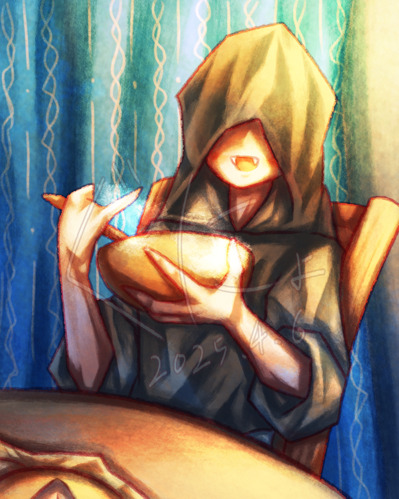
‘I am happy to dine with you.’ 「一緒に食べると美味しいね」
I've been living with a neighbourhood ghoul for a few months now. The food he prepares is very tasty, especially the meat dishes, which are better than in a casual restaurant. My life is full of happiness, and I jog home every day because I can't wait for his ‘welcome home’ and home-cooked meals. It is a lie that not so long ago I was lonely, bored and even frustrated by the sounds of my next door' lives. Now I don't have time to think about such trivial things and can concentrate only on the happiness in front of me. Come to think of it, I don't think I've even felt any sign of my next doors' recently, let alone the sounds of their lives. This warm and lively communal life must be drowning out the noise. 近所の食屍鬼と同棲を始めて早数か月 彼の作る料理はとても美味しく、特に肉料理は下手な飲食店よりもおいしい 私の生活は幸せに満ち溢れ、彼の「おかえり」と手料理が待ち遠しくて毎日足早に帰宅している 少し前まで孤独と退屈さ、それに油を注ぐかのような隣人の生活音にいら立ちを感じていたことが嘘のようだ 今ではそんなつまらない事を考える暇などなく、目の前の幸せだけに集中できるようになった そういえば最近、隣人の生活音はおろか気配すら感じなくなった気がする 温かくにぎやかなこの共同生活が、煩わしいノイズをかき消してくれているのだろう
3 notes
·
View notes